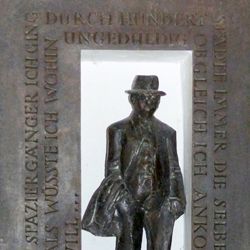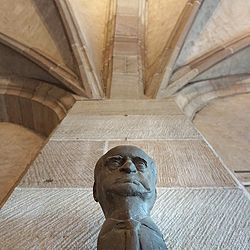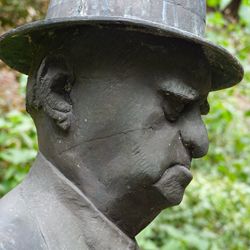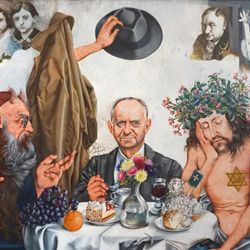Hermann
Kesten
writer
born Podwoloczyska / Galizien, heute Ukraine, 28. Jan 1900
died Basel, 03. May 1996
Son of Isaak (1871-1918), merchant. ∞ Nuremberg 20.12. 1928 Toni Warowitz (* 1904 - † 1977).
Kesten spent his childhood and youth in Nuremberg.
After attending the Bismarckschule 1906-10 and the Altes Gymnasium 1910-19, he studied at the universities of Erlangen and Frankfurt/Main 1919-23.
From 1927 he was chief editor of the Kiepenheuer publishing house in Berlin until he had to leave Germany as a Jew in 1933.
From 1933-40 he was in charge of publishing German-language authors for the Allert de Lange publishing house in Amsterdam and emigrated to New York in 1940; from 1953 he lived mainly in Rome.
Kesten was president of the German PEN from 1972-76;
In 1995 he donated the prize money for the first International Nuremberg Human Rights Award.
He was awarded the Culture Prize of the City of Nuremberg (1954), the Nelly Sachs Prize (1977), an honorary doctorate from the faculties of philosophy at the University of Erlangen-Nuremberg (1978) and honorary citizenship of the City of Nuremberg (1980).
His statue is in the city library in the Katharinenkloster, created in 1988 by Wilhelm Uhlig.
Works: Verz. s. Ulf von Dewitz/Wolfgang Buhl (eds.): Ich hatte Glück mit Menschen.
On the 100th Birthday of the Poet Hermann Kesten (Contributions to the History and Culture of the City of Nuremberg 24), 2000.
Lit.: Buhl, 1971; Ulf von Dewitz (ed.): Unter uns - Hermann Kesten - Gedenkveranstaltung der Stadt Nürnberg am 14. Juli 1996 (BZ-Materialien 4),
Clemens Wachter
(quoted from the Nuremberg Künstlerlexikon published by Manfred H. Grieb)
______
In the café I cheated the idleness of others with my work.
(Hermann Kesten / "Der Dichter im Café, edition published by ars vivende, 2015, p. 12)
______
No city is foreign to me, I only need to sit down in a café and I feel at home. Idleness connects people. I prefer to work in the face of idle people rather than be idle in the face of working people. I observe with pleasure how they are amused. I am in love with those who are in love. Laughing, I take part in their laughter.
(Hermann Kesten / "Der Dichter im im Café", published by ars vivende, 2015, p. 14)
______
My literary coffee house is only a symbol of the power of reason. I only mock the false prejudices, the false legends in literature, the false ideas of civilisation or even culture, as they say in Germany. I mock the false figure of the poet and superstition and irrationalism or the idea that art, the freest play of reason, thrives best without reason.
(Hermann Kesten / "Der Dichter im im Café, edition by ars vivende, 2015, p.165)
Period: 20th c.



